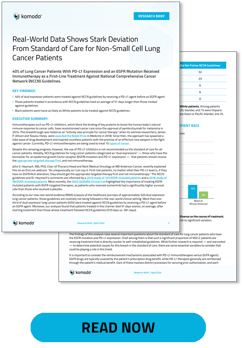Why Are So Many Non-Small Cell Lung Cancer Patients Receiving Immunotherapy Against National Guidelines?
.png)
It’s become almost impossible to turn on a television or scroll the internet without encountering an advertisement for PD-L1 inhibitors. These breakthrough immunotherapies, which block the binding of key proteins to boost the human body’s natural immune response to cancer cells, are now being used to treat over 15 types of cancer. While these therapies represent a bold new frontier in how we think about cancer treatment, they are not recommended for all cancer patients.
Specifically, non-small cell lung cancer (NSCLC) patients with an epidermal growth factor receptor (EGFR) mutation and PD-L1 expression — who we categorize as “dual expressors” — are called out in National Comprehensive Cancer Network (NCCN) Guidelines as a group that should not receive PD-L1 inhibitors as a first-line treatment. Instead, the guidelines recommend these patients receive the appropriate targeted therapy first.
 That detail is what makes the findings of our new real-world evidence (RWE) analysis of lung cancer patient journeys so concerning. According to our research that tracked the healthcare experiences of 520 dual expressor lung cancer patients, more than one-third (40%) were treated against NCCN guidelines by receiving a PD-L1 agent before an EGFR agent. The research also found that these patients died 51 days sooner, on average, after starting treatment than those whose treatment followed NCCN guidelines (310 days vs. 361 days). This result raises even more questions about why patients are treated against internationally recognized guidelines.
That detail is what makes the findings of our new real-world evidence (RWE) analysis of lung cancer patient journeys so concerning. According to our research that tracked the healthcare experiences of 520 dual expressor lung cancer patients, more than one-third (40%) were treated against NCCN guidelines by receiving a PD-L1 agent before an EGFR agent. The research also found that these patients died 51 days sooner, on average, after starting treatment than those whose treatment followed NCCN guidelines (310 days vs. 361 days). This result raises even more questions about why patients are treated against internationally recognized guidelines.
The research also found notable variations in the race and ethnicity profiles of patients who received treatment outside of NCCN guidelines. Notably, Black patients were twice as likely as White patients to be treated against guidelines.
These findings are a starting point for the deeper research that must be conducted to better understand the potential reasons for this deviation in standards of care. It raises some important considerations about how newer therapies are being adopted and prescribed by physicians in real-world scenarios. Among the critical questions that remain unanswered are whether external factors, such as widespread consumer awareness and enthusiasm for immunotherapies, different reimbursement mechanisms, or even patient-specific variables are causing this divergence from recognized clinical guidelines.
The analysis was done using Komodo’s Healthcare Map™ in combination with NeoGenomics Laboratories’ genomic testing data. We first identified the cohort of dual expressor lung cancer patients, and then drilled down into specific patterns of treatment those patients received. This approach of marrying the patient journey with the details of each patient’s genomic profile represents a significant step forward in using RWE to better understand large-scale patient and provider behavior and identify potential gaps in care.
Read the full analysis here.
Learn how Komodo Health’s MapLab™ solution can uncover new insights in record time.
To see more articles like this, follow Komodo Health on X, LinkedIn, or YouTube, and visit Insights on our website.
.png?width=980&height=515&name=blog03%20blank%20(1).png)





